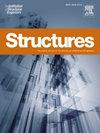Failure mode and debris range prediction of an earth-covered magazine under internal blast loading
Abstract
Safe distance is a paramount consideration in the construction and research of hazards warehouses. To address this concern, a comprehensive approach has been employed, integrating the Arbitrary Lagrangian-Eulerian (ALE) technique and the multi-material fluid-solid coupling method (MMFSCM) for simulating the dynamic failure process of earth-covered magazines under internal blast forces. Additionally, a dedicated tool has been developed to forecast the three-dimensional trajectory and dispersion range of structural debris. The reliability of both the numerical simulation and the forecasting tool has been rigorously validated through experiments involving an earth-covered magazine subjected to internal explosions triggered by significant TNT charges. Findings indicate that the external pressure resulting from these internal detonations exhibit distinct directional characteristics. Notably, structural fragments generated by implosion predominantly disperse towards the front wall and both sides of the main axis, with the maximum dispersal distance reaching 727 m. In addition, the presence of earth covering reduces both the degree of structural damage and the velocity of fragment ejection. This study holds significance for professionals and scholars in the field of ammunition depot design, specifically in relation to safety range management.

 求助内容:
求助内容: 应助结果提醒方式:
应助结果提醒方式:


